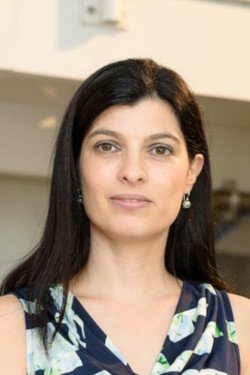Rina Rosenzweig
2023 Israel Award Winner — Faculty

Current Position:
Senior Scientist
Institution:
Weizmann Institute of Science
Discipline:
Structural & Cellular Biology

Current Position:
Senior Scientist
Institution:
Weizmann Institute of Science
Discipline:
Structural & Cellular Biology
Recognized for: Discovering the regulatory mechanism by which “chaperone” proteins drive the innate ability of our cells to prevent and reverse protein aggregation. This phenomenon, in which misfolded proteins form large accumulations, has been associated with many neurodegenerative conditions, such as Alzheimer’s, Parkinson’s, and Huntington’s diseases. Harnessing and amplifying natural methods to reverse aggregation paves the way to treatments for these conditions.
Areas of Research Interest and Expertise: Structural Biology, Protein Dynamics, Nuclear Magnetic Resonance, Molecular Chaperones, Protein Aggregation.
Previous Positions:
BSc in Chemistry, Technion – Israel Institute of Technology
PhD in Biochemistry, Technion – Israel Institute of Technology
Postdoctoral Researcher, University of Toronto, Canada
Research Summary:
The healthy function of our bodies’ cells relies on the carefully orchestrated interactions of thousands of function-specific proteins. When these interactions break down because proteins misfold or aggregate, severe neurodegenerative conditions like Alzheimer’s, Parkinson’s, and Huntington’s diseases can occur. Rina Rosenzweig, PhD, is uncovering the secrets behind our cells’ innate quality control system, molecular chaperones: a specific class of proteins that prevents and reverses general protein misfolding and aggregation. The highly dynamic and transient nature of chaperones’ interactions make them notoriously difficult to characterize, however, Rosenzweig is using a unique combination of structural and functional approaches to understand their mechanisms in never-before-seen detail.
Throughout her career, Rosenzweig has developed deep insight for how specific molecular chaperones perform their function on an atomic level. This knowledge led to her landmark discovery of how specific molecular chaperones—Hsp40 and Hsp70—are triggered to break up protein aggregations associated with Parkinson’s disease. The discovery of this “molecular switch” will hopefully lead to the development of novel therapeutic agents that target Parkinson’s and other aggregation-related disorders.
The health implications of molecular chaperones go beyond neurodegenerative diseases. Cancer cells generally require a high supply of molecular chaperones to survive, but simply inhibiting that supply would lead to significant side effects. Rosenzweig has now demonstrated specific modulations to molecular chaperones that could inhibit cancer cell growth without impacting other functions, potentially offering new cancer treatments with far fewer side effects.
"All my life, I was intrigued to figure out how things work. Now I get to research the fundamental processes of life - studying molecular machines which ensure all the proteins in our cells remain functional. I feel doubly blessed, both for this honor, and that I received it doing what I love."
Key Publications:
Other Honors:
2022 Russell Varian Young Investigator International Award in Magnetic Resonance
2021 Hestrin Prize for Excellence in Biochemical Research, The Israel Society for Biochemistry and Molecular Biology
2016 The Azrieli Foundation Faculty Fellow, The Azrieli Foundation
2013 Lap-Chee Tsui Award, Canadian Institutes of Health Research
2012 Banting Postdoctoral Fellow, Government of Canada
2010 Women In Science Postdoctoral Award, Weizmann Institute, Israel